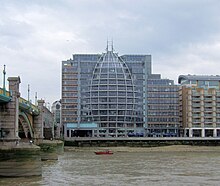 Ofcom offices at Riverside House, Bankside, next to Southwark Bridge in London | |
| Abbreviation | Ofcom |
|---|---|
| Formation | 29 December 2003 |
| Type | Statutory corporation |
| Legal status | Created by Office of Communications Act 2002[1] |
| Purpose | Regulator and competition authority for broadcasting, postal services, telecommunications and radiocommunications spectrum |
| Headquarters | London, England |
| Location | |
Region served | United Kingdom |
Official language | English, Welsh |
Chairman | Michael Grade[2] |
Chief Executive | Melanie Dawes |
Main organ | Board of Directors |
| Staff | 902 (full-time equivalents) (in 2019) |
| Website | ofcom |
The Office of Communications, commonly known as Ofcom, is the government-approved regulatory and competition authority for the broadcasting, telecommunications and postal industries of the United Kingdom.
Ofcom has wide-ranging powers across the television, radio, telecoms and postal sectors. It has a statutory duty to represent the interests of citizens and consumers by promoting competition and protecting the public from harmful or offensive material.[3][4]
Some of the main areas Ofcom regulates are TV and radio standards, broadband and phones, video-sharing platforms online, the wireless spectrum and postal services.
The regulator was initially established by the Office of Communications Act 2002 and received its full authority from the Communications Act 2003.[1]
- ^ a b "Office of Communications Act 2002 – 2002 CHAPTER 11". Office of Public Sector Information. 19 March 2002. Retrieved 23 February 2010.
- ^ "Maggie Carver appointed Ofcom interim Chair from January". Ofcom. 15 December 2020. Retrieved 26 August 2021.
- ^ "Your rights – Ofcom". The Liberty Guide to Human Rights. Liberty. 12 August 2010. Archived from the original on 11 January 2014. Retrieved 11 January 2014.
- ^ Lunt, Peter; Livingstone, Sonia (2007). "Regulating markets in the interest of consumers?: on the changing regime of governance in the financial service and communications sectors.". Governance, consumers and citizens: agency and resistance in contemporary politics (PDF). Basingstoke, UK: Palgrave Macmillan. pp. 139–161. Retrieved 11 January 2014. Footnote 15.